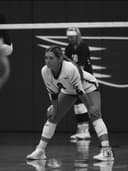
 2024 March NA Fra...
2024 March NA Fra... NA Dec 2023 Show ...
NA Dec 2023 Show ... Cole Wheaton 2023...
Cole Wheaton 2023... Cole Wheaton #1 N...
Cole Wheaton #1 N... USHL Green Bay Ga...
USHL Green Bay Ga... SSM / NAPHL Playo...
SSM / NAPHL Playo...At 17-years old, Cole Wheaton was in an unfamiliar place, sleeping in an unfamiliar bed.
Wheaton had just moved to Gillette after spending the last two years in Minnesota. In a few weeks, Wheaton would take the ice for his first season in junior hockey in America. But the first few days were hard — he missed his family and knew it would be a while before he could see them again.
Luckily, Wheaton wasn’t completely new to moving around. He was born in Calgary in Alberta, Canada, before he moved with his family to Orange County in California. The family moved again for his dad’s work to Plano, Texas, before finally moving to Gentry Academy in Vadnais Heights, Minnesota.
Growing up in Canada, hockey was always around Wheaton. His dad was a goalie in the Alberta Junior Hockey League when it was smaller. Wheaton’s only sibling, an older brother, was a goalie as well.
“When I quit baseball, there was really only one option,” Wheaton said. “I started skating when I was two and started playing when I was 5.”
The Wheaton family spent two years in Minnesota where Cole played for Gentry Academy’s 15U and 16U teams. He was going into his third year when COVID-19 shut down the season. Wheaton had somewhere to go — but it would mean moving once again.
The next stop in his hockey career would be Gillette, where he has spent three of the past four years. But this time, he would move in by himself.
Playing goalie is different than a lot of other positions in sports because the best thing to do, as Wheaton puts it, is to shut off your brain. Reacting, not thinking, is the best way to play.
Wheaton’s hockey journey has allowed him to learn how to shut off his mind and just play. Whether it’s a big game against Helena where he faces 50 shots or a slow night against Butte when he might see 15-20 shots, part of Wheaton’s brain is off. He’s watching the puck, waiting to react as fast as possible for a save.
The Wild typically consists of people between 16 and 20. When Wheaton joined, he was the youngest goalie and was the second-youngest player on the team.
“Some of these guys graduated high school and then move out — I was still a senior,” Wheaton said. “It sucks, especially when you’re a 17-year-old kid. I was still living with my mom and dad.”
Wheaton’s played in 17 games in his first year of junior hockey. He did well enough that he moved up a tier to the Kenai River Brown Bears of the North American Hockey League for the following year.
The move was supposed to be Wheaton’s big opportunity. There was a possibility that Wheaton could continue to rise after his season with the Brown Bears and move to the United States Hockey League — the top junior hockey league in the country — or get a Division I college offer.
It didn’t happen. Instead, he was turned away from Tier 2 and returned to the NA3HL.
“There was hopefully two years of playing in that league, maybe get a D1 offer,” Wheaton said. “It didn’t happen for me. Everything happens for a reason. Maybe it’s not for you, maybe you don’t get the luck.”
It’s a difficult reality in junior hockey. Few people make it this far in their careers, but even fewer get to move on to the higher leagues or play in college, much less play professionally. Players get closer than most to accomplishing their dreams, but still face incredible odds to make it all the way.
But Wheaton didn’t stay down about it for long. He’s reacting. He turns his brain off on all of the things he cannot control. All he’s focusing on is stopping the puck.
“It sucked, but the love for the game saves it,” Wheaton said. “Getting cut from a Tier 2 team and coming back down sucks. But I was lucky enough to come back to Gillette, to come back to the boys and the organization that has always been there for me. So, I want to do something for the organization. It’s not about me anymore — it’s about these guys developing and winning the championship.”
Wheaton has learned to love the process, even if that means that the 3HL is the best level of competition that he will play in. He hopes to play Division III if he receives an offer from a school he’d want to go to, but he also understands the reality and importance of preparing for a post-hockey life.
“I’ve put everything into hockey,” Wheaton said. “(My family) has moved states, moved homes just for me to play hockey. My parents have put a lot into my hockey career. I’ve put a lot into my hockey career. To say it is a big part of my life — it’s basically the whole thing.”
Wheaton has been able to watch the Wild grow with coach Ethan Hayes, both of whom came to Gillette for the 2020-21 season. The year before they both arrived, the Wild missed the playoffs for the first time in their history.
The team has changed dramatically since then. Wheaton is the only member of that team still playing, but assistant coach Austin Newson was a forward on that team.
In the three previous years, the Wild have made it to the Fraser Cup Playoffs, but haven’t been able to advance to the Fraser Cup Championship, which is a tournament-style playoff that hosts the five division champions and a wild card team.
But this year is Wheaton’s final year in junior hockey. He will either get an offer to play college hockey, or his career is over. Whether this is the end of his playing days or not, Wheaton wants to finish his junior hockey career on top. It’s a lot to think about for someone who also has the task of being the top goalie on the team.
There’s a lot of enjoyment to playing junior hockey. It’s a lot like college, but without classes. The team practices Monday through Thursday from 10:45 to 12:15. They have an extra 30 minutes to practice and shoot the puck on the ice at Spirit Hall. After that, the team is completely free to spend the day as they choose.
The Wild play lots of video games and eat team dinners together. Typically, the NHL video game is a popular game, but the boys have been playing Fortnite with the game’s release of its original map.
“You get a great group of boys to be around,” Wheaton said of the perks of junior hockey. “And with a small town like Gillette, everyone rallies around you. Once football season is over and everyone is coming to our games and they really just rally around us and support us.”
But for Wheaton and some of the returners from previous years, there’s a lot that needs to get done on the ice. The Wild are currently at the top of the Frontier Division with two regulation wins over the rival Helena Bighorns. Wheaton said that grudge isn’t over from last year — the Wild need to beat them in the playoffs.
“I’ve got one more year to do it, one more year to do something special,” Wheaton said.
This year is a little different. Wheaton will sleep soundly on a bed he’s familiar with, in a house he’s spent the majority of the past two years in — his first year he stayed with a different family. He’s adapted to his new environment, and is now a staple on the Gillette Wild.
His brain is off, and he’s ready for whatever comes his way.
| Statistic | 2024 Gillette Wild | 2023 Gillette Wild | 2022 Kenai River Br | 2021 Gillette Wild | 2019 Gentry Galaxy | 2018 Gentry Galaxy |
|---|---|---|---|---|---|---|
| Goals Against Avg. | 2.9 | 2.70 | 3.5 | 3.48 | 2.0 | 1.55 |
| Shutouts | 2 | 2 | 1 | 6 | 7 | |
| Save Pct. | 0.92 | .930 | .900 | 0.910 | 0.915 | 0.913 |
| Total Saves | 921 | 794 | 294 ( 33 shots / game, last 10 games) | 743 shots 20 games played .500 winning % averaged 40 shots / game | 677 of 740 shots | 683 |







